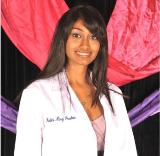Medical Student Perspectives: Volunteering in Honduras
Danger! Violent crime! Poverty! These are just some of the words often used to describe the current situation in Honduras. I must admit that I, too, initially perceived the country in this manner after learning that it holds the dubious title of the world's murder capital. To add to my consternation, the U.S. Peace Corps had just pulled out of Honduras due to its concerns about the safety of its volunteers. Once there, I realized that despite my concerns about safety and the truly destitute living conditions for many in Honduras, the majority of the people were still remarkably optimistic and content.
Growing up in privileged countries like Canada and the United States, we often take for granted essential freedoms and the many small everyday privileges we enjoy. Upon arrival in Honduras, our group was immediately whisked away by heavily armed police and military personnel in a large school bus to the compound that would be our base for the duration of our stay. For most of us, it was a very unfamiliar and an initially unnerving experience to be escorted by heavily armed personnel wherever we went.
The following morning we had an early start to accommodate the 2.5-hour commute to the small village of Santa Maria. Upon arrival, we noticed hundreds of families already lined up and waiting. As soon as our group saw the overwhelming masses of people awaiting medical care, we began our set up of the temporary clinic. In one room, a triage station was set up while in another, the physicians consultation room, then a dental room, and at the very end, a pharmacy. Since space was limited, patients did not have much privacy. It was the best that could be done under the circumstances. The whole group was anxious to get started, understanding our time constraints and the large number of people who needed to be seen. We started seeing the first patients within 30 minutes of arrival.
All of the medication and medical supplies available to us were donated and brought by our group to Honduras. This limited our treatment options. Many of the patients suffered from chronic aches and pains from repetitive work or arthritis. A simple dose of acetaminophen or ibuprofen was sufficient to alleviate pain in many cases. Sadly, many did not have access to these basic "over-the-counter" medications.
Medically speaking, a large proportion of the patients had chronic illnesses, such as hypertension, diabetes, COPD, and many fungal skin infections. Surprisingly, in spite of the advanced stages of some of their conditions, the patients were not very concerned. They barely complained of pain even when we knew their conditions had to be extremely uncomfortable. Instead, they were simply grateful for the opportunity to see a physician and to receive some medication to treat their conditions. Each patient seen was given, at a minimum, albendazol to treat any parasitic worm infections, multivitamins to combat malnutrition, and NSAIDS for minor fevers and pains. Patients greatly appreciated receiving these medications as it was either unavailable or unaffordable for them.
Some of the patients seen were young pregnant women expecting their first child. For the majority of them, it was a unique opportunity to receive any prenatal care. A portable ultrasound machine brought to Honduras by our group proved to be a very valuable resource in screening these women. They were able to see their babies on the ultrasound, learn approximately how far along the pregnancy they were, and know if their babies were healthy. Unfortunately there was one pregnancy that was diagnosed with placenta previa with full coverage of the internal OS. The doctor and I knew that this pregnancy was high risk and that it may result in death if the mother tried to deliver the baby on her own. Fortunately, since the ultrasound caught this abnormality, the young woman was advised to deliver her baby in the city where a Caesarean section could be performed.
The ultrasound was a very valuable asset on the trip, and it was used to diagnose a wide range of medical concerns. Many patients with chronic abdominal pain were screened to ensure there was no organomegaly. Some patients were diagnosed with epididymitis and were given appropriate medical treatment. An infant with a motor developmental delay was even diagnosed with meningomyelocele and referred to a specialist in the city.
I was exposed to one patient for whom nothing could be done. This was quite an eye-opening experience for me as a student. A six-month-old baby girl had far advanced hydrocele. The diameter of her head was already three times the size of a normal child her age, and it was deformed. I realized that there was nothing that could be done to save this child's life at this point, not even in the United States. Had the baby been fortunate enough to be born in the United States or Canada, a ventricular shunt may have been put in at a much earlier stage. The shunt would have prevented the gross deformity and may have prevented the mental retardation that followed. In my mind, this particular case delineated for me the differences between life in a poor country compared to life in a rich country with available health care.
In spite of the sadness of some of the cases, the overall benevolent nature of the trip made it worthwhile. It is a good feeling knowing that we were able to make a difference, even if it was small in some cases. In the course of a week, we managed to visit two underprivileged villages and see approximately 1000 patients. It is a real privilege to grow up and live in a developed country without fear for one's security, starvation, or lack of health care, and it should never be taken for granted.
 |
Rashmi Maraj Prashad |

